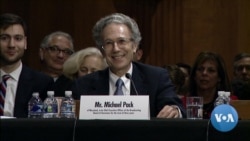Seven foreign journalists whose work visas expired and whose contracts were not renewed at the U.S. government's independent news agency by the administration of former President Donald Trump have sued for wrongful termination and are seeking damages and back pay.
The journalists claim that Michael Pack, a conservative filmmaker nominated by Trump as chief executive officer of the U.S. Agency for Global Media, wrongfully dismissed them, harming their careers and forcing three of them to leave the U.S.
Pack, who resigned after he was asked to step down by President Joe Biden hours after his inauguration in January, had during his eight-month tenure as head of USAGM refused to renew 30 visas of foreign journalists that allowed them to work in the U.S.
In suits filed at the U.S. Court of Federal Claims in Washington, the journalists cited Pack's comment in an August 2020 interview that being "a journalist is a great cover for a spy" and said that J-1 visa holders might try to "penetrate" USAGM.
Soon after Pack took charge at USAGM in June 2020, he fired several heads of the media networks he oversees. Pack later launched a "comprehensive investigation" into the agency's operations because of what he said were "long-term security failures" that undermined its mission.
Members of Congress at the time publicly questioned whether the moves were eroding the networks' editorial independence. USAGM oversees Voice of America, Radio Free Europe/Radio Liberty, the Middle East Broadcasting Network, and other U.S. funded news and information outlets.
Expired visas forced journalists abroad
Three of the journalists who have filed suit, Valdya Baraputri of Indonesia and Paula Alves Silva and Julia Riera of Spain, were forced to leave the country after Pack refused to renew their visas and they were dismissed from the agency. Some of the journalists claimed that USAGM deceitfully backdated termination documents to make it look like the agency was following proper procedures in dismissing them.
VOA and other U.S.-funded networks rely on J-1 visas to bring in foreign journalists who have the language skills, specialized regional knowledge and contacts needed for the agencies' journalistic mission. All seven journalists had successfully passed comprehensive security and background checks as part of their hiring process, according to their lawsuits, which said Pack had offered no evidence that they posed a security risk to the U.S.
Baraputri had been scheduled to broadcast live from the Republican National Convention the same day she was forced to fly home to Indonesia.
Another journalist, Carolina Valladares Perez, is a former war correspondent in the Middle East who previously had worked for the BBC. Prior to Pack taking over as head of the government's umbrella media agency, Valladares Perez said she was awarded a $4,000 performance bonus for her work as a broadcast journalist for Voice of America's Spanish service.
After she was fired from USAGM, her suit contends that she "has since disappeared from the news radar, which has had devastating consequences," and has been able to only make a few thousand dollars in freelance work since then. She said that it has been "nearly impossible to get her career back on track" and is asking for more than $100,000 in damages.
At the time of the dismissals, members of Congress called on Pack to justify the decisions not to renew their visas, saying that it risked endangering the journalists and the mission of USAGM's media networks.
The U.S. government has not filed a response to the complaints, and recently asked the court for an extension.
USAGM spokeswoman Laurie Moy said in an emailed statement to VOA that since January, USAGM leadership has been working "to build back the agency following actions taken by the previous CEO."
She said that the agency's acting CEO Kelu Chao and other officials "are fully committed to seeing this work through. We have achieved a great deal and continue to work to right any outstanding wrongs." Moy declined to comment on the specific claims in the lawsuits but said they are taking the matter "quite seriously."
Some of those suing the agency have been offered their jobs back, but others still face bureaucratic hurdles.








